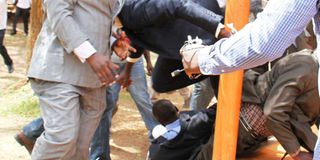National Democratic Institute calls for peace pledge

ODM members brawl over direct nomination, at Orange House on April 5, 2017. Political parties have been urged to foster peaceful elections. PHOTO | NATION MEDIA GROUP
What you need to know:
- It said sound measures must be put in place to avoid politically-motivated violence around the elections.
- The electoral agency has already indicated that it has formed a team to enforce the political parties code of conduct.
A Washington-based political lobby has raised concerns over the country’s preparedness for a violence-free election in August.
The National Democratic Institute said with only four months to the election, sound measures must be put in place to avoid politically-motivated violence around the elections.
A pre-election delegation from the institute that included former South Africa Independent Electoral Commission chair Brigalia Bam, former Nigeria Independent National Election Commission chair Attahiru Jega and former US Assistant Secretary of State for Africa Constance Newman among others said the country needed to do more to guarantee a flawless election.
“Already, a number of killings and other violence with political implications have already taken place and difficulties in meeting the electoral calendars are apparent,” said the delegation in their report.
“Concerted efforts will be required of all electoral actors for credible and peaceful elections to be realised,” added the report made public Monday.
INTENSITY OF CHAOS
The team held a series of meetings with the Independent Electoral and Boundaries Commission officials, political party leaders, government officials, Chief Justice David Maraga, National Assembly Speaker Justin Muturi and religious and civic leaders.
The delegation revealed that virtually everyone they met expressed serious concern about the potential for violence before, during and after the polls slated for August 8.
“The stakeholders asserted that the question is not whether there will be violence but how much and where,” they said.
“Many noted that the increased interest in county level elected positions for governor and assemblies is likely to increase potential for violence at that level.”
More than 40,000 aspirants have expressed interest in the 1,450 county level seats, a clear indication that competition will be tough.
PARTY NOMINATIONS
The delegation also expressed worry that the anti-violence efforts mounted this year did not match those in the run-up to the last General Election.
“The heavy drought has also led to deaths resulting from farm invasions by pastoralists in politically volatile areas. Killings and other violence with implications have already occurred this year,” they said.
The delegation further noted that stakes were likely to be high during the party nominations, scheduled for April 13 to 26, leading to violence.
“This, therefore, places responsibility on the parties and law enforcement agencies to take effective measures to prevent the violence,” they said.
They said effective dispute resolution mechanisms will be important in ensuring that tension during the primaries did not exacerbate potential for violence in the run-up to the polls.
The electoral agency has already indicated that it has formed a team to enforce the political parties code of conduct and that candidates could be barred if they gravely violate it.
PEACE PLEDGE
The delegation suggested that all presidential candidates and key party leaders come together to make a peace pledge before the elections.
They called upon the electoral commission, security agencies and groups working on early warning and peaceful elections to share information and strengthen coordination efforts for elections.
They said security officers must be cautioned against use of excessive force and that a clear statement be made concerning the accountability of the security forces.
The team further expressed worry that the political and legal wrangling, for instance, had delayed the installation of new poll commissioners until January 20, leaving less than seven months for them to organise the election.
“That timing would be difficult in any country and is compounded by the fact that the electoral environment is extremely polarised,” they said.
PROCUREMENT
The officials further raised concerns about the procurement of election equipment to be used during the polls, saying any potential legal challenges could create further complications and threaten the election calendar.
“At the same time, political parties, civil society and the media should act responsibly with their information and not usurp the role of the IEBC in announcing the official election results,” said the delegation.




